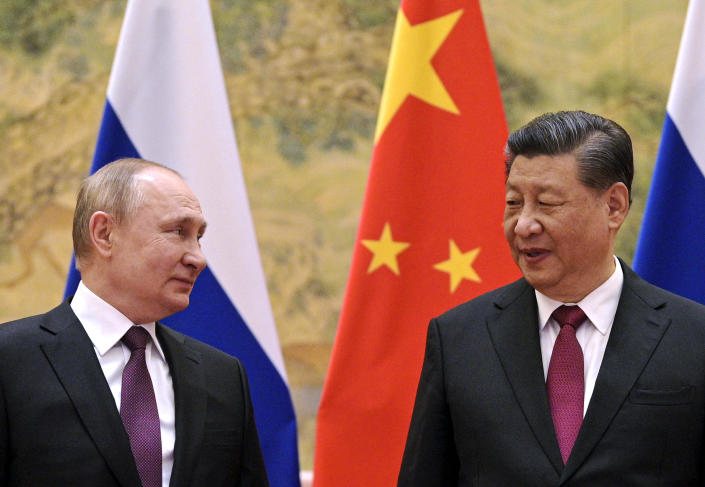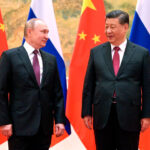Russian President Vladimir Putin was in Beijing on Friday to attend the Winter Olympics opening ceremony, but also to meet with China‘s leader, Xi Jinping. China and Russia have grown much closer in recent years as they’ve become more estranged from the West, and more at odds with the U.S.
The two leaders met just days after Putin dug his heels in more deeply in his high-stakes standoff with the U.S. and NATO over Moscow’s buildup of troops and weapons along Ukraine‘s borders.
The U.S. accused Putin on Thursday of plotting a so-called “false-flag” operation in Ukraine, alleging that covert operatives were already in place and working to create a fake video depicting an attack that Russia could use as a pretext to invade its neighbor.
The Biden administration did not provide any direct evidence of the plot for public consumption, but insisted that intelligence gathered by the U.S. and its partners shows Russia is working with “crisis actors” inside Ukraine to create such a video.
State Department spokesman Ned Price told an Associated Press reporter, who suggested the U.S. government’s assertion alone wasn’t enough, that if he wanted to question “the credibility of the U.S. government, the U.K. government and other governments and find solace in information that the Russians are putting out, that is for you to do.”
Ukrainian and American officials have warned for weeks that Russia could use such tactics — which may include cyberattacks and staged violence inside Ukraine intended to create chaos and erode confidence in its government. Russia is known to favor these secretive methods, and it has used them before, including in Ukraine.
Officials in Kyiv said on Friday that the Biden administration had shared its intelligence on the purported Russian plot to stage a propaganda video, and that they were waiting to learn more.
The Biden administration said it went public with the information in the hope of deterring Russia from using such tactics.
If Putin did decide to attack Ukraine — despite his government insisting daily that it has no plans to do so — China’s support could be crucial to Russia, says CBS News senior foreign correspondent Holly Williams.
The U.S. has threatened to respond to any Russian invasion of Ukraine with swift and severe sanctions. China, with its giant economy, could help offset the impact of international sanctions on Russia, whether they target banks or the country’s supply chains.
China has also been increasingly at odds with the U.S. over its human rights record, its mounting intimidation of Taiwan and other smaller neighbors, and its crackdown on what had been, until about a year ago, the semi-autonomous, democratic enclave of Hong Kong.
Putin met privately with China’s Xi Jinping before the opening ceremony in Beijing, and the leaders issued a joint statement afterward showing a united front in the face of Western criticism. The statement, posted on the Kremlin’s website, sought to portray Russia and China not as challengers of democracy and freedom on the world stage, but as purveyors of it.
Without naming any adversaries explicitly, the message was clear: The world is changing, and China and Russia won’t be held back.
“Some forces representing a minority on the world stage continue to advocate unilateral approaches to solving international problems and resort to power politics, practice interference in the internal affairs of other states, damaging their legitimate rights and interests, provoking contradictions, disagreements and confrontation,” the statement said.


The joint message on democracy came from two countries where dissidents are persecuted for voicing opposition to the government.
“Democracy,” they declared in unison, “is not built on stencils. Depending on the socio-political structure, history, traditions and cultural characteristics of a particular state, its people have the right to choose such forms and methods of implementing democracy that correspond to the specifics of this state. The right to judge whether a state is democratic belongs only to its people.”
The message, at face value, may be easy for the democratic West to dismiss: Russian and Chinese people do not “have the right to choose such forms and methods of implementing democracy” as they wish, as neither country has free and fair elections and speaking out against the existing “forms and methods” of governance often ends badly for those brave enough to try it.
But putting aside the rhetorical flourish, there was a far more literal message in the joint statement from China and Russia.
The two nations, it said, “reaffirm their firm mutual support in protecting their fundamental interests, state sovereignty and territorial integrity, and oppose the interference of external forces in their internal affairs.”
CBS Reports presents “Reverb | The QAnon Effect”
What’s next for President Biden’s Build Back Better bill
U.S. accuses Russia of planning disinformation plot to justify invasion of Ukraine




